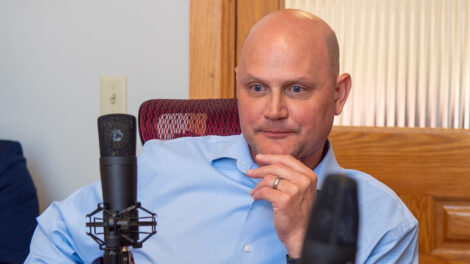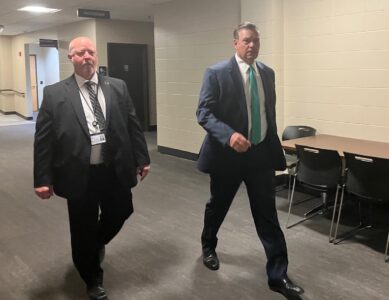Vonnegut: Lawyers could use literary lesson
Famous author drawn into debate over school finance
Topeka ? When the Kansas Supreme Court takes up the school finance case next week, it might well ponder a futuristic story from the 1960s by science fiction satirist Kurt Vonnegut.
Attorneys representing students from the Shawnee Mission district say the story “Harrison Bergeron” shows that a world of forced equality would be a nightmare, so unequal funding of public schools is OK.
Their legal brief says capping local taxes on schools was unconstitutional, and they cited the 1961 story, which depicts a future society where everyone is made equal by forcing impediments on anyone who is better.
“Nobody was smarter than anybody else,” the attorneys quoted Vonnegut as writing. “Nobody was better looking than anybody else.
But in a telephone interview Wednesday, Vonnegut told the Journal-World that the students’ attorneys may have misinterpreted his story.
“It’s about intelligence and talent, and wealth is not a demonstration of either one,” said Vonnegut, 82, of New York. He said he wouldn’t want schoolchildren deprived of a quality education because they were poor.
“Kansas is apparently handicapping schoolchildren, no matter how gifted and talented, with lousy educations if their parents are poor,” he said.
Latest chapter
The debate over Vonnegut’s story was the latest chapter in the school finance lawsuit before the Kansas Supreme Court.
The court has ruled that the $2.7 billion in school funding is inadequate and distributed unfairly. The Legislature has approved a $142 million increase and allowed local districts to raise property taxes nearly $500 million more.
Critics say the increase is not enough and the local property tax options will widen the disparity between wealthy and poor districts. The court will hear oral arguments on the new legislation Wednesday.
Attorneys representing 40 students from the Shawnee Mission school district in Johnson County filed a brief supporting the Legislature’s new law, and went further, saying there should be no limit on how much local districts could raise in taxes for local schools.
Any attempt to cap local taxes for schools is unconstitutional, they argue, “because it impermissibly infringes on individual liberty and related fundamental rights and usurps local school board authority to supplement public education over and above the suitable level.”
The attorneys included in their brief the Vonnegut story, which takes place in the year 2081 “and everybody was finally equal.”
“Nobody was stronger or quicker than anybody else. All this equality was due to the 211th, 212th, and 213th Amendments to the Constitution, and to the unceasing vigilance of agents of the United States Handicapper General,” the story says.
In the story, smart people have to wear radios that emit distracting noises, pretty people must wear hideous masks, and athletic people are weighed down with bags of birdshot.
Tristan Duncan, an attorney representing the Shawnee Mission students, said the Handicapper General was like the state putting a cap on how much local schools can spend on students, which “restricts free will and the pursuit of excellence.”
But Vonnegut said the Handicapper General would be the one hurting poor students by depriving funds to their schools.
Rupe weighs in
Alan Rupe, an attorney representing plaintiff school districts on the opposing side, said the Shawnee Mission brief was “well-written” but that he disagreed that local districts should be allowed to raise as much as they want.
“I would classify this as the Johnson County viewpoint of the world,” Rupe said. “This kind of viewpoint exists when there is not adequate funding for all schools,” he said.
Rupe said that he didn’t oppose the use of some local taxes for schools, but that under the current system local taxes were used for essentials in schools and that was not fair to poor districts that couldn’t raise much in local taxes.
“We don’t want to cut off any mountain tops. We want to raise the valleys so kids in poor areas come up to the mountain tops,” he said.
Rupe said he hadn’t read the Vonnegut story but remembered reading his work in college.
“I’m glad,” Rupe said, “to see someone is quoting Kurt Vonnegut.”
Vonnegut said he didn’t mind the story being used in the lawsuit.
“The story is quite well-known,” he said. “It’s taught a lot in high school.”








